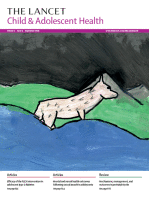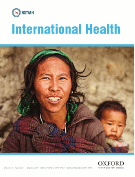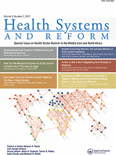
Nepal Journal of Epidemiology
Scope & Guideline
Fostering collaboration for impactful public health research.
Introduction
Aims and Scopes
- Epidemiological Research and Analysis:
The journal publishes studies that analyze the distribution and determinants of health-related states in specific populations, focusing on both communicable and non-communicable diseases. - Public Health Policy and Practice:
Research that informs and shapes public health policy, including health systems strengthening, health equity, and the impact of social determinants on health outcomes. - Innovations in Health Technology and Informatics:
Exploration of new technologies and informatics tools in healthcare, including the use of artificial intelligence, telemedicine, and health informatics for improving patient outcomes. - Global Health Issues:
A strong emphasis on global health challenges, particularly those relevant to low- and middle-income countries, such as infectious diseases, mental health, and environmental health. - Interdisciplinary Approaches:
Encouragement of mixed-methods research and interdisciplinary collaboration to address complex health issues, integrating perspectives from different fields.
Trending and Emerging
- Impact of COVID-19 on Health Outcomes:
Research focusing on the multifaceted impacts of the COVID-19 pandemic, including mental health, long COVID, and public health responses, is increasingly prominent as the world continues to navigate post-pandemic scenarios. - Environmental Health Concerns:
There is a growing focus on the health impacts of environmental factors, such as microplastics and pollutants, indicating a trend towards recognizing the interplay between environment and health. - Mental Health and Technology Use:
The emergence of topics like 'nomophobia' and the mental health implications of technology use suggests a rising interest in understanding contemporary psychological issues in the context of digital life. - Innovative Research Methodologies:
A clear trend towards the use of mixed-methods research and complex trial designs highlights the journal's commitment to advancing research methodologies for more comprehensive health insights. - Health Inequalities and Global Health:
Increased attention to health disparities and inequalities in health research reflects a growing awareness of social determinants of health and the need for equitable health solutions.
Declining or Waning
- Traditional Infectious Disease Research:
Although infectious diseases remain a critical focus, the frequency of traditional studies without innovative approaches or new insights has decreased, possibly due to the saturation of existing knowledge. - Basic Clinical Trials Without Novel Methodologies:
There appears to be a waning interest in basic clinical trials that do not incorporate innovative designs or advanced methodologies, as the journal shifts towards more complex and innovative trial designs. - Local Case Studies with Limited Generalizability:
While local case studies have their relevance, there has been a reduction in such studies that do not provide broader implications or insights applicable to wider populations.
Similar Journals

Global Health-Science and Practice
Empowering Global Health Insights for a Healthier Tomorrow.Global Health-Science and Practice, published by the prestigious Johns Hopkins Center for Communication Programs, is a vital open-access journal dedicated to advancing the fields of global health and health policy. With an ISSN of 2169-575X and a remarkable track record since its inception in 2013, this journal serves as a platform for innovative research and policy analysis, empowering a diverse audience including researchers, practitioners, and students. Currently ranked in the Q2 category in Health Policy and Public Health, and Q1 in Medicine (miscellaneous) as of 2023, it boasts Scopus rankings that highlight its influence and reach within the global health community. Located in Baltimore, MD, this journal not only facilitates the sharing of critical insights but also promotes evidence-based practices that can shape policy and improve health outcomes worldwide. With its commitment to accessibility and quality, Global Health-Science and Practice remains an essential resource for those dedicated to addressing global health challenges.

Global Health Research and Policy
Advancing global health through impactful research.Global Health Research and Policy, published by BMC, is a leading open-access journal dedicated to advancing the field of global health through impactful research and policy analysis. Since its establishment in 2016, the journal has garnered a prestigious reputation, achieving a Q1 ranking across several categories including Epidemiology, Health Policy, Health (social science), and Public Health, Environmental and Occupational Health in 2023. With an E-ISSN of 2397-0642, this UK-based journal ensures the dissemination of high-quality research to a global audience, promoting accessibility and collaboration. The open-access model facilitates the sharing of knowledge and innovation essential for addressing pressing health challenges worldwide. Researchers, professionals, and students alike will find valuable insights and relevant policy discussions in each issue, making Global Health Research and Policy a vital resource for those committed to improving health outcomes on a global scale.

Journal of Health Research
Championing interdisciplinary collaboration in health policy.Welcome to the Journal of Health Research, an esteemed publication in the field of health policy and public health, published by COLL PUBLIC HEALTH SCIENCES at Chulalongkorn University, Thailand. With an E-ISSN of 2586-940X and an ISSN of 0857-4421, this open access journal has been dedicated to advancing scholarship since its transition to open access in 2018. The journal serves as a vital platform for disseminating high-quality research that addresses pressing health issues within both local and global contexts. It currently holds a Q3 rating in the categories of Health Policy and Public Health according to the 2023 Quartiles, and is ranked #395 in Public Health and #186 in Health Policy out of their respective categories on Scopus. With a commitment to fostering innovative approaches and interdisciplinary collaboration, the Journal of Health Research invites researchers, professionals, and students alike to contribute and engage in critical discussions that further the public health narrative.

Journal of Research in Health Sciences
Championing evidence-based practices in health sciences.Journal of Research in Health Sciences, published by Hamedan University of Medical Sciences, is a prominent international journal that has been disseminating research findings in the fields of public health, epidemiology, and health policy since its inception in 2009. With an ISSN of 2228-7795 and E-ISSN 2228-7809, the journal has established a solid reputation, currently ranked in the third quartile (Q3) across several categories related to health, as noted by Scopus. The journal serves as a vital resource for researchers, professionals, and students, offering rich insights into the complex interactions within health sciences and facilitating the dissemination of innovative research that addresses pressing health challenges. The journal's reach extends beyond Iran, contributing to global discourse and promoting evidence-based practices in health. By providing an open-access platform, it ensures that vital information is readily accessible to the academic community and beyond, fostering a collaborative environment for advancing health sciences research.

Lancet Child & Adolescent Health
Innovating Child and Adolescent Health SolutionsLancet Child & Adolescent Health is a premier academic journal published by Elsevier Scientific Ltd, focusing on groundbreaking research in the fields of Developmental Psychology and Pediatrics. Since its inception in 2017, the journal has quickly gained prominence, evidenced by its remarkable ranking in the Q1 quartile across both its disciplines and its impressive Scopus rankings, placing it in the 99th percentile of Developmental Psychology and Pediatric research. With an emphasis on enhancing child and adolescent health outcomes through high-quality, peer-reviewed articles, the journal serves as an essential platform for researchers, healthcare professionals, and academics. Although it operates without open access, the impact of this journal extends globally as it bridges the gap between innovative research and practical application in clinical settings, elucidating the ever-evolving landscape of child and adolescent health. It is located in the vibrant academic environment of the Netherlands, providing a crucial repository for knowledge aimed at transforming practices and improving well-being for younger populations.

Infectious Diseases Now
Empowering healthcare through open access research.Infectious Diseases Now is a premier academic journal dedicated to the evolving field of infectious diseases, published by Elsevier France - Éditions Scientifiques Médicales Elsevier. With an ISSN of 2666-9927 and an E-ISSN of 2666-9919, this journal stands at the forefront of disseminating critical research and clinical insights from 2021 to 2024. The journal's commitment to open access means that groundbreaking studies are readily available to researchers, healthcare professionals, and students, fostering a collaborative approach to tackling global health challenges. As evidenced by its Q2 quartile ranking in the 2023 Scopus category of Infectious Diseases, and its impressive position within the top 25% of its field, Infectious Diseases Now serves as an essential resource for those involved in the study and management of infectious diseases. By publishing high-quality research, case studies, and reviews, the journal plays a pivotal role in advancing knowledge and improving patient care in this vital area of medicine.

International Journal of Public Health
Shaping the Future of Health through Open AccessInternational Journal of Public Health, published by FRONTIERS MEDIA SA, is a preeminent open-access journal that plays a pivotal role in disseminating groundbreaking research in the dynamic fields of public health, environmental health, and the social determinants of health. Established in 2003 and rapidly gaining recognition, this journal has achieved a prestigious Q1 ranking in both Health (social science) and Public Health, Environmental and Occupational Health as of 2023, underscoring its impact in the scholarly community. With its comprehensive scope, the journal aims to facilitate the open exchange of knowledge and innovative solutions for global health challenges. Researchers, professionals, and students can easily access the latest findings and discussions that shape the future of public health policy and practice, making it an invaluable resource for those committed to enhancing healthcare outcomes. The journal is headquartered in Lausanne, Switzerland, reflecting its commitment to a global perspective on public health issues.

Central European Journal of Public Health
Uniting Voices for a Healthier Central EuropeThe Central European Journal of Public Health, ISSN 1210-7778 and E-ISSN 1803-1048, is a vital academic forum published by the NATIONAL INSTITUTE OF PUBLIC HEALTH, Czech Republic. With its comprehensive coverage of contemporary issues in public health and medicine since its inception in 1993, this journal aims to bridge the gap between research and practice, fostering a deeper understanding of health dynamics within Central Europe and beyond. As a Q3 ranked journal in both the fields of Medicine (miscellaneous) and Public Health, Environmental and Occupational Health as per 2023 metrics, it provides an accessible platform for innovative studies, policy analyses, and reviews that contribute to the global discourse on public health challenges. Though primarily based in the Czech Republic, it welcomes contributions from a worldwide audience, enhancing its scope and impact. Researchers, practitioners, and students will find invaluable insights that not only enrich academic scholarship but also inform effective public health interventions.

International Health
Fostering Dialogue on International Health ChallengesInternational Health, published by Oxford University Press, is a leading peer-reviewed journal dedicated to the exploration and advancement of health and healthcare practices across the globe. With its ISSN 1876-3413 and E-ISSN 1876-3405, the journal focuses on a wide variety of topics within the realm of international health, catering to a diverse audience of researchers, professionals, and students. It currently holds a prestigious position in the 2023 quartile rankings, being categorized as Q1 in Health (Social Science) and Q2 in both Medicine (Miscellaneous) and Public Health, Environmental and Occupational Health, reflecting its significant impact within these fields. Although the journal is not open access, it remains a valuable resource, providing crucial insights and fostering discussion around health systems, public policy, and global health challenges from 2009 to 2024. With a strong emphasis on empirical research and innovative practices, International Health serves as a vital platform for knowledge dissemination and scholarly discourse, making substantial contributions to the field of public health worldwide.

Health Systems & Reform
Navigating Challenges in Health Systems TogetherHealth Systems & Reform is a premier open-access journal that serves as a vital resource for researchers, professionals, and students interested in the dynamic fields of health informatics, health information management, and public health. Published by ROUTLEDGE JOURNALS, TAYLOR & FRANCIS LTD, this journal has quickly distinguished itself with impressive Q1 rankings in its category quartiles for 2023, indicating its leading position in the academic discourse of health systems research. With the ISSN 2328-8604 and E-ISSN 2328-8620, it has been committed to innovative research dissemination since it became open access in 2020, ensuring that critical findings are accessible to a wider audience. The journal's effective alignment with current challenges in health services and reforms makes it an essential platform for advancing knowledge and driving improvements in health systems globally. Recognized in the Scopus rankings, it holds a significant place within Public Health and Health Informatics, reinforcing its importance to academia and industry alike. Researchers engaging with this journal will find a wealth of pertinent discussions that facilitate the synthesis of practical solutions aimed at enhancing health care delivery.